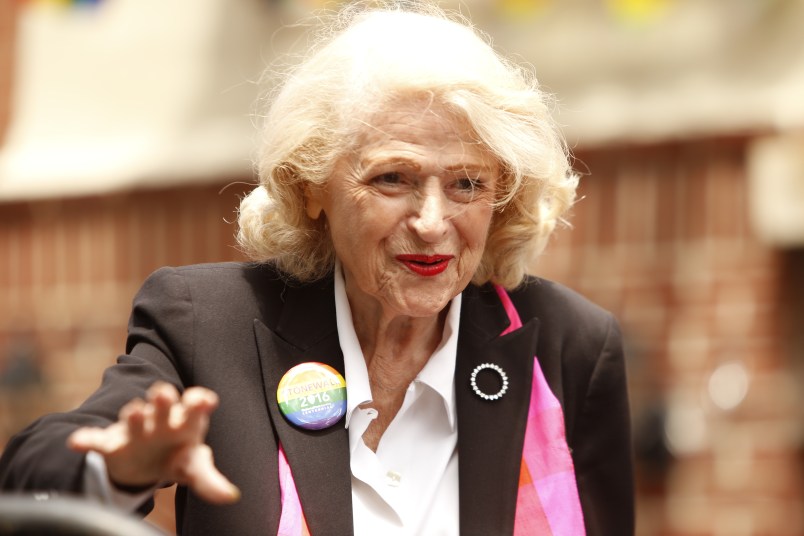Let me return to something I wrote about yesterday and said I’d return to: Adam Jentleson’s piece in the Times on whether the Democratic Party can learn to say no to interest groups that often demand assent to various positions and commitments that are either obscure or toxic to a majority of voters. Trans rights aren’t the only issue Jentleson was talking about. But the larger debate clearly revolves around the ad the Trump campaign ran against Kamala Harris saying she supported tax payer-funded sex change operations/gender affirming care for prisoners. This was a question Harris checked “yes” to on an ACLU candidate questionnaire in 2019 as part of her 2020 run for the presidential nomination. There is at least the perception among some that it played a non-trivial role in turning the campaign against her
As a general matter I agree with Jentleson’s point. Not specifically about trans rights issues, but more generally. The goal of parties and campaigns is first to win elections.
But I can’t say that without noting some recent history.
There’s at least a decent argument that Democrats lost the 2004 election over gay marriage. It certainly wasn’t the biggest issue. But Republicans, cynically and shrewdly, got state ballot initiatives banning gay marriage on the ballot in a number of key states. Ohio seemed like the keyest. The electoral logic was the same one that got abortion rights initiatives on so many state ballots this year. They were not only there to turn back restrictions and bans — Democrats also supported them to turn out more Democratic voters, to shape the electorate in their favor.
In many of those states, abortion bans were already in place. So the threat wasn’t theoretical. In most states in 2004, the chance of same-sex marriage becoming legal was highly notional, or at least it seemed that way. Same-sex marriage was already the law in Massachusetts after a protracted litigation. That’s where marriage rights were winning at the time, to the extent they were: in courtrooms and judicial rulings which found that bans violated state constitutions. So the argument was that voters needed to add explicit language banning same-sex marriage to their constitutions to block rogue judges.
Who knows whether it actually turned the election. But it’s not a far-fetched argument given how close the result was. There’s no question that substantial majorities of voters opposed same-sex marriage rights at the time, though of course support varied from more liberal to more conservative states. The default position for more progressive or liberal Democrats at the time was civil unions — most or all of the protections but still a secondary status. Remember that Barack Obama remained at least nominally a civil unions supporter until 2012. There were plenty of Democrats making this electoral argument at the time: why are you demanding full marriage equality when that’s just going to get you George W. Bush, who will certainly be much worse for gay rights than John Kerry?
A decade later, marriage equality was the law of the land and by that time it had already become law in a number of states through legislative action.
The simple point is that I don’t think you get to the Obergefell decision in 2015 without 2004 or the whole range of marriage equality activism in the first years of this century. In fact, I’m also certain you don’t. And I guarantee it was an albatross and super annoying to tons of Democratic elected officials. It’s possible it cost Democrats the 2004 election. It generated all sorts of agita and in many cases anger that LGBT activists were pushing the envelope so hard.
This doesn’t shift my overall way of thinking about politics. A party can’t get pulled to every group’s maximalist position — whether it be LGBT rights, climate, criminal justice, social democracy, etc., etc. — if it wants to be focused on the business of winning elections. But I also know the Democratic Party was wrestling with an issue that at the time felt very similar — a clearly unpopular position which spurred a visceral sort of opposition in many voters. Today, many Americans under 30 can barely believe that something like marriage equality was ever up for debate. Even many soft opponents can barely remember what all the fuss was about.
Of course, this discussion is incomplete without noting various other causes that in retrospect seem ill-conceived or over-reaching. It’s not always obvious what’s going to seem obviously meritorious and necessary in retrospect. One could make at least broadly comparable arguments about civil rights, women’s rights, abortion and many other issues.
This doesn’t make me feel different about the point of elections in general. My point here isn’t to resolve this tension but to recognize it, look straight at it. No two issues are identical. But these two, 20 years apart, are close enough to compel us to draw some lessons in both directions — to recognize how we often see such issues differently in retrospect and at the time.
Perhaps this is just part of being the political party from which new conceptions of right and new vistas of inclusion and equality emerge.




